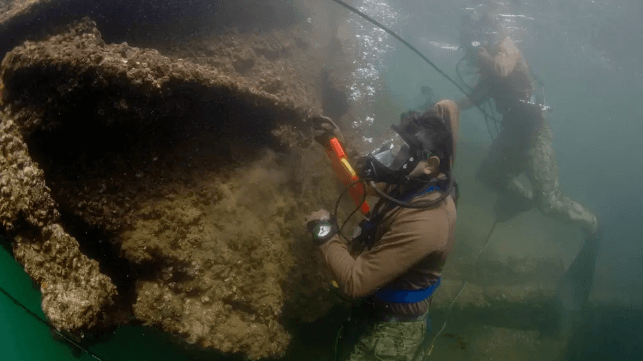Federal Stop-Work Order Puts Pause on Research to Help Navy Divers

Everybody needs a buddy – especially Navy divers. Working underwater is physically taxing, visibility is low, and divers can easily become exhausted or suffer from insufficient oxygen or nitrogen narcosis, resulting in cognitive impairment. The problem with relying on a partner who can come to your rescue, however, is that they are vulnerable to the same conditions.
That’s why Cornell researchers are working to understand how robots can assist humans in dangerous and physically challenging environments.
“We have these tools with amazing capacity, but for them to work with people, they need to be able to understand people,” said Andrea Stevenson Won, associate professor of communication in the College of Agriculture and Life Sciences. “So if we have a robot buddy that can work with a diver when they’re doing these dangerous, challenging tasks in this really stressful setting underwater, then we can leverage all of the strength of the person – their intelligence, their ability to make good decisions quickly, to change strategies on the fly – and we can have a robot buddy that can keep them safe so that they can do that job again the next day.”
In April, Won’s research, funded by the U.S. Department of Defense, came to a halt when she received a stop-work order.
“We were told that more information would be forthcoming, and we’ve heard nothing,” she said. “It’s frustrating because we can’t continue the work that we had started on, but we haven’t heard anything that would let us know how to continue. Without this funding, we don’t have the opportunity to help push the research forward.”
Through her Virtual Embodiment Lab, Won uses virtual reality simulations to understand how people’s nonverbal behavior can provide insight into their states of mind and their interactions with their teammates.
Won’s team was working with an array of collaborators, including Shiri Azenkot, associate professor at Cornell Tech, whose research into assistive technology for blind and low-vision users has helped the group think about ways to communicate with a robot when a diver can’t see or hear well.
The research is relevant for other environments and tasks, such as fighting fires, which has more in common with diving than one might think, according to Won.
“Divers and firefighters both work in dangerous situations, where they’re used to working with teammates, but where a robot could be really helpful to help protect the humans and make their work more efficient,” she said.
A second project focuses on identifying and predicting “inflection points” in human teams when something unexpected occurs, such as when equipment breaks or someone is injured. By better understanding human movement and physiological data when the team’s rhythm is disrupted, robots can recognize when they need to offer assistance.
The inflection point project was funded by the Navy but translates to many domains, Won said. “It relates to health care, it relates to emergency responders, and those are also both examples of circumstances that are really time sensitive,” she said. “We hoped to take it to those environments, specifically to the hospital environment, as a next step. So that’s been delayed.”
Won’s collaborators on the inflection point project include Poppy McLeod, professor of communication (CALS), who studies communication and decision making in task-oriented groups, a neuroscientist at Pennsylvania State University and an expert on artificial intelligence at Stanford University.

that matters most
Get the latest maritime news delivered to your inbox daily.
“Both of these projects are bringing together people who have different skillsets to bring to the same problem,” Won said. “They are working together. Their students are working together. Now, without that federal level support, we’re all just working individually again. So it’s a real lost opportunity in that respect.”
David Nutt is a senior staff writer at the Cornell Chronicle, which provided reprint permission for this article. The story may be found in its original form here.
The opinions expressed herein are the author's and not necessarily those of The Maritime Executive.
